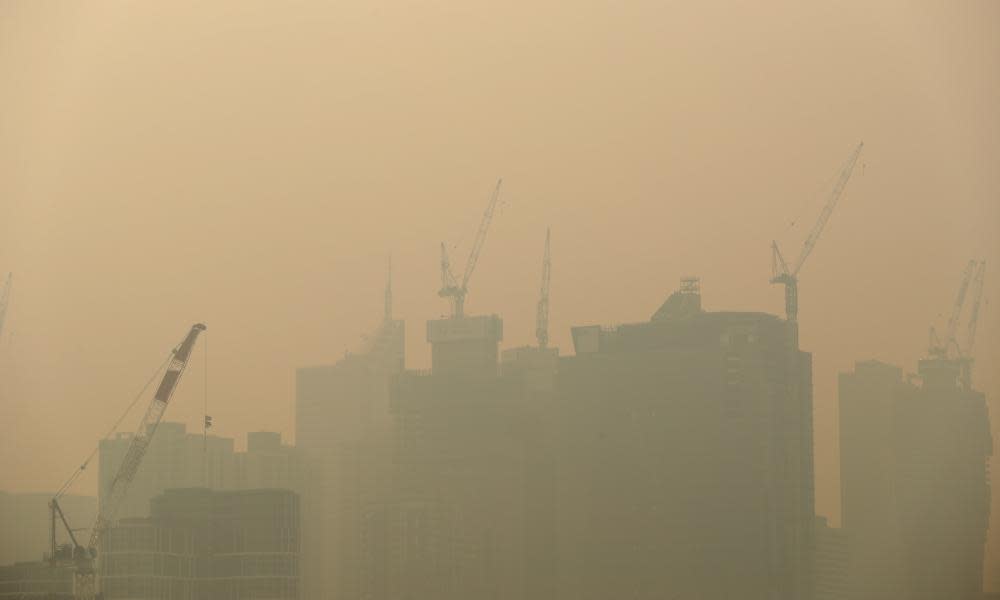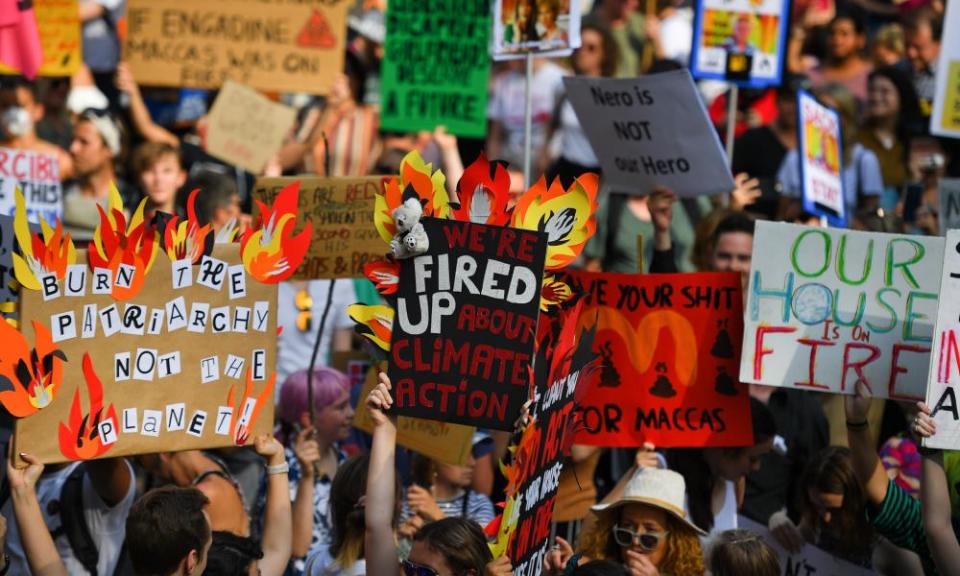Behind the smokescreen, the Coalition's stance on climate change hasn't changed at all

The speed with which the conservative side of politics and the media has gone from assuring us climate change was not a problem, so we don’t need to worry about reducing emissions, to asserting that climate change is a problem, but we still don’t need to worry about reducing emissions, is breathtaking. Literally, given the levels of smoke still around.
You don’t get a cookie for saying you think climate change is real.
I’m sorry, you don’t. All you get is the capacity to say you have reached 1990 levels of comprehension – as that was when the first IPCC report was issued. You don’t get a prize for spending 30 years doing all you can to halt, undermine and dismantle action to reduce emissions, only to now say: “Hey, climate change is real.”
Consider that the Sydney Morning Herald this week ran a front page story headlined “Minister slams climate debate”, with the lead that “Australia’s bushfire crisis has prompted a blunt warning from Science Minister Karen Andrews to those she says are wasting time arguing about whether climate change is real”.
Oh good, that’s all sorted then.
But when you read on, you see nothing in her statement suggest one iota of a shift in the government’s position on emissions. She told the Herald: “My starting position in the discussion tomorrow will be that the climate has changed and it continues to change. We need to focus on the steps to adapt and mitigate the impact of those changes.”
The important point is she desires to mitigate the impact of the change, not to mitigate the actual change.
Right now the government is indulging in the equivalent of responding to polio by promising to invest in more iron lungs. And bizarrely, it is getting credit for it.
Adaptation is not mitigation.
The need for action on climate change is the need to reduce emissions
What is being said now is no different to what was said by Tony Abbott back when he was prime minister. In 2015, Abbott told parliament: “As far as the government is concerned, climate change is real. Mankind makes a contribution, and it is important to have strong and effective action to deal with it.
“We have met and beaten our Kyoto targets ... We are on track to meet and beat our current commitments to reduce emissions by 2020 by 13 per cent on 2005 levels.”
He then concluded: “I’m not going to put someone’s job at risk, a region’s, town’s future at risk, I’m not going to put up electricity prices to do it, I’m not going to put a tax on them to do it. I’m going to achieve it in the way we’ve met our Kyoto 2020 targets, meet and beat, and we’ve done that through better technology, through the policies we’ve put through the emissions reduction fund, and we’re going to continue to do that because it is really important.”
Oh sorry, that wasn’t Abbott, that was Scott Morrison in his interview with David Speers last Sunday.
If you can discern any difference in language between what Morrison is now saying and what Abbott said in 2015, then your level of reading between the lines has become so great you are seeing things that are not there.
Just because we all desire the Coalition to do something on climate change doesn’t actually mean they will.

And their actions over the past decade mean they have not earned the benefit of doubt, rather they have earned our total scepticism.
The same goes for the conservative media. This week the NT News was getting praise for its front page, in which it stated: “What Australian needs now is real, affordable solutions – not armies of keyboard warriors.”
But aside from the pretty random sideswipe at keyboard warriors, the statement is the perfect representation of meaningless dribble designed to sound like a bold stance.
You know what is a real and affordable solution? Putting a price on carbon. And yet in the NT News editorial, the word emissions was not even mentioned, and I am prepared to bet my superannuation fund they would not suggest a price on carbon was an affordable solution.
Similarly the Daily Telegraph’s editorial on Thursday on “Moving climate debate forward” praised the government’s policy and demanded the ALP come clean with how much theirs would cost.
Give me strength.
It seems that moving forward is reenacting the exact same coverage that occurred during the last election.
You can’t say you agree with the science on climate change and then completely disregard the science that calls for the need to reduce emission by 45% from 2010 levels as soon as possible and to get to zero net emissions by at least 2050.
Saying you agree with the science of climate change but that you believe the government’s current plan is adequate is like saying you agree with vaccination, but you chose to only get one of your three kids immunised because, heck, that is more affordable.
Related: The Coalition isn't being honest about the climate crisis. But neither is Labor | Greg Jericho
The cheapest way to deal with the cost of climate change is to reduce our emissions and prevent, as much as is possible, further increases in global temperatures.
Dealing with climate change will be tough – people will lose jobs, the prices of some things will rise, but the cost of inaction is going to be much greater and more damaging – both to our economy and to our society.
Fortunately, the path to a vibrant emissions-free economy remains, and as Ross Garnaut has pointed out, such a shift will be extremely beneficial for our economy if we act now.
Indeed perhaps the most frustrating thing about the past decade is that not only have we have wasted a chance to reduce emissions, we have forgone the opportunity to set up our economy for the next 100 years.
Do not fall for the government’s spin. The need for action on climate change is the need to reduce emissions and to also take a leading role in that fight on the international stage.
So when you hear someone in government say they believe in climate change, ask what they are doing about reducing emissions; everything else is spin.

 Yahoo News
Yahoo News 
